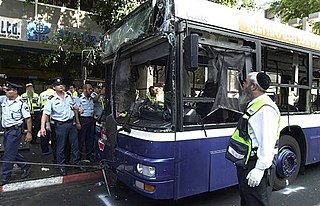
The Second Intifada, also known as the Al-Aqsa Intifada, was a major Palestinian uprising against Israel. The general triggers for the unrest are speculated to have been centred on the failure of the 2000 Camp David Summit, which was expected to reach a final agreement on the Israeli–Palestinian peace process in July 2000. Outbreaks of violence began in September 2000, after Ariel Sharon, then the Israeli opposition leader, made a provocative visit to the Al-Aqsa compound on the Temple Mount in Jerusalem; the visit itself was peaceful, but, as anticipated, sparked protests and riots that Israeli police put down with rubber bullets and tear gas.

The Popular Front for the Liberation of Palestine – General Command or PFLP-GC is a Palestinian nationalist militant organisation based in Syria.
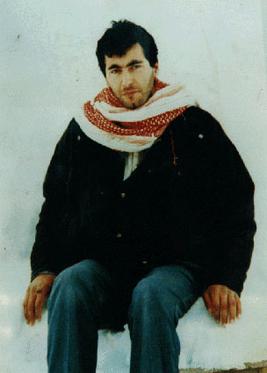
Yahya Abd-al-Latif Ayyash was the chief bombmaker of Hamas and the leader of the West Bank battalion of the Izz ad-Din al-Qassam Brigades. In that capacity, he earned the nickname the Engineer. Ayyash is credited with advancing the technique of suicide bombing in the Israeli–Palestinian conflict. The bombings he orchestrated caused the deaths of approximately 90 Israelis, many of them civilians. He was assassinated by Shin Bet on 5 January 1996.

Eric Clifford Ambler OBE was an English author of thrillers, in particular spy novels, who introduced a new realism to the genre. Also working as a screenwriter, Ambler used the pseudonym Eliot Reed for books cowritten with Charles Rodda.
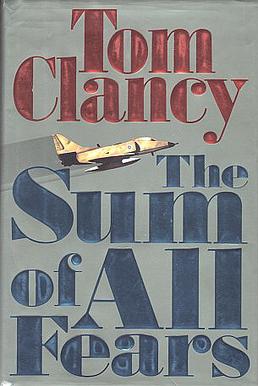
The Sum of All Fears is a political thriller novel, written by Tom Clancy and released on August 14, 1991, as the sequel to Clear and Present Danger (1989). Main character Jack Ryan, who is now the Deputy Director of Central Intelligence, tries to stop a crisis concerning the Middle East peace process wherein Palestinian and former East German terrorists conspire to bring the United States and Soviet Union into nuclear war. It debuted at number one on the New York Times bestseller list. A film adaptation, which is a reboot of the Jack Ryan film series and starring Ben Affleck as the younger iteration of the CIA analyst, was released on May 31, 2002.
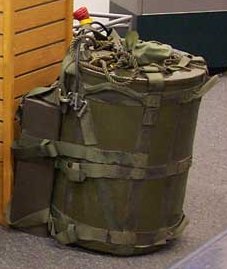
A suitcase nuclear device is a tactical nuclear weapon that is portable enough that it could use a suitcase as its delivery method.

A Palestinian suicide bombing on Sbarro, a pizzeria in downtown Jerusalem, took place on 9 August 2001, in which 16 civilians were killed, including 7 children and a pregnant woman, and 130 wounded.
This page is a partial listing of incidents of violence in the Israeli-Palestinian conflict in 2005.

Palestinian political violence refers to acts of violence perpetrated for political ends in relation to the State of Palestine or in connection with Palestinian nationalism. Common political objectives include self-determination in and sovereignty over Palestine, or the "liberation of Palestine" and recognition of a Palestinian state, either in place of both Israel and the Palestinian territories, or solely in the Palestinian territories. More limited goals include the release of Palestinian prisoners or the Palestinian right of return. Other motivations include personal grievances, trauma or revenge.
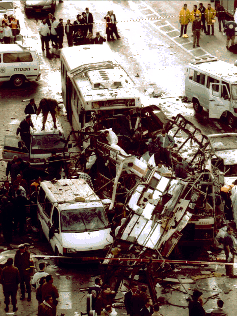
Terrorist attacks were carried out on two No. 18 buses on Jaffa Road in Jerusalem, in 1996. Hamas suicide bombers killed 45 people in the attacks, which were masterminded by Mohammed Deif, using explosives prepared by Adnan Awul. These two bombings, within a few days of each other, occurred during a Hamas offensive launched after the killing of Yahya Ayyash, which also included the French Hill neighborhood attack, a suicide bombing in Ashkelon, and a terrorist attack near Dizengoff Center in Tel Aviv.
The 2006 shelling of Beit Hanoun by the Israeli Defence Force (IDF) happened on 8 November, when shells hit a row of houses in the Gaza Strip town of Beit Hanoun, killing at least 19 Palestinians and wounding more than 40. The shelling followed the IDF's withdrawal from the Gaza Strip in completion of a week-long operation codenamed Operation "Autumn Clouds", which the Israeli government stated had been intended to stop the Qassam rocket attacks on Israel by Palestinian militants. The Israeli government apologized and attributed the incident to a technical malfunction.
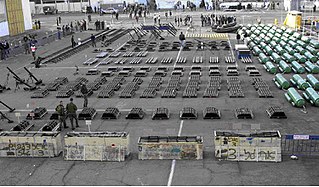
The Karine A affair, also known as Operation "Noah's Ark", was an Israeli military action in January 2002 in which the Israel Defense Forces (IDF) forces seized MV Karine A, which, according to the IDF, was a Palestinian freighter in the Red Sea. The vessel was found to be carrying 50 tons of weapons, including short-range Katyusha rockets, antitank missiles, and high explosives.

A suicide attack is any violent attack where any attackers have accepted their own death as a direct result of the attacking method used. Suicide attacks have occurred throughout history, often as part of a military campaign, and more recently as part of Islamic terrorist campaigns. Although generally not regulated under international law by themselves, many suicide attacks violate international laws of war such as perfidy or targeting civilians.

Since 2001, Palestinian militants have launched thousands of rocket and mortar attacks on Israel from the Gaza Strip as part of the continuing Arab–Israeli conflict. The attacks, widely condemned for targeting civilians, have been described as terrorism by the United Nations, the European Union, and Israeli officials, and are defined as war crimes by human rights groups Amnesty International and Human Rights Watch. The international community considers indiscriminate attacks on civilian targets to be illegal under international law.
Events in the year 2004 in Israel.
Events in the year 2003 in Israel.

The al-Aqsa Martyrs' Brigades is a coalition of Palestinian armed groups in the West Bank. The organization has been designated as a terrorist organization by Israel, the European Union, Canada, Japan, New Zealand, and the United States.
The 2014 Gaza war beach bombing incidents refers to two incidents that took place during the 2014 Gaza War on 9 and 16 July. In the first incident, Israeli missiles killed nine youths while they were following the 2014 FIFA World Cup on TV; in the second, four boys were killed by Israeli naval fire while playing on a beach. According to an Israeli investigation, the second was a 'tragic mistake'. The latter attack was conducted in front of hotels that sheltered foreign journalists, several of whom witnessed the Israeli shelling, and at least one of whom described the targeting of the children as intentional. Several eyewitnesses have remarked that, even at a distance, it was clear that the targets of the Israeli attack were children. The United Nations Fact Finding Mission on the 2014 Israel–Gaza conflict, reviewing the evidence, found that the IDF had failed in its obligations to adopt feasible measures to avoid or minimize incidental harm to civilians.













